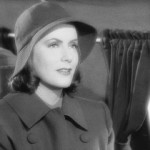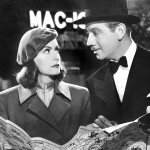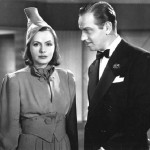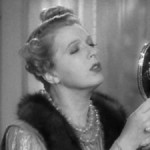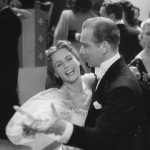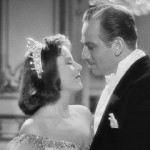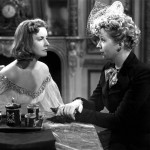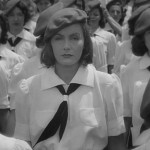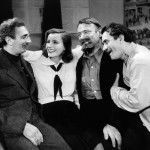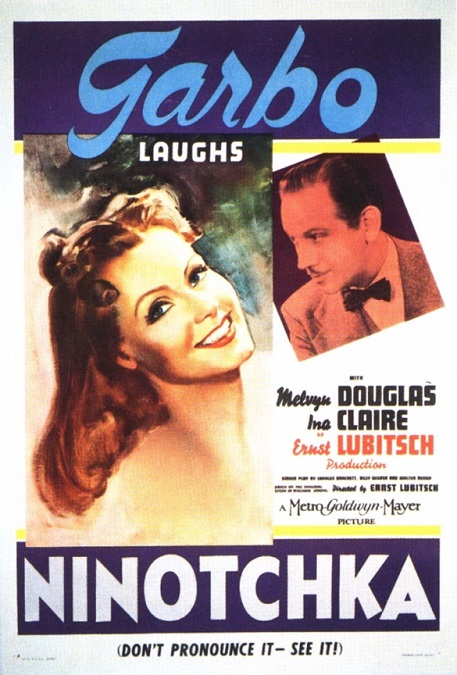
Ninotchka – 1939
This is the second film I have seen starring Greta Garbo. The first was the 1931/1932 Best Picture winner, Grand Hotel. There was no doubt that she was a stunningly beautiful woman, and she could act with skill and finesse. But Ninotchka has the distinction of being both her first comedy, and her penultimate film. But the problem for me is that it wasn’t terribly funny, or perhaps I should say that for me, there were very few funny moments, making it almost seem like Garbo’s performance was not very good.
However, that is not at all true. Her performance was just fine. It was the script by Billy Wilder, Charles Brackett, and Walter Reisch that didn’t quite work for me. The humor was largely political, having to do with Russia during the Stalin era. But I’m no history buff so many of the jokes were lost on me.
Three Russian men, Iranov, Buljanov, and Kopalsky, played by Sig Ruman, Felix Bressart, and Alexander Granach, respectively, are sent to Paris, France to sell some jewels which were confiscated from the Russian Grand Duchess Swana, played by Ina Claire in the Russian Revolution of 1917. The Duchess, who now lives in Paris, learns that her precious jewels are in the city and she wants them back, considering them to be her own property, unlawfully stolen after the revolution.
But the three men become seduced by the free and easy lifestyle of Paris, which is in great contrast to the drab and oppressive society of their mother Russia. When they fail to complete the sale of the jewels, Ninotchka is sent in to get the men in line. Garbo played the part as serious to a fault and utterly humorless. She goes out of her way to remain stony and strict. But I think that this is where much of the political humor was supposed to be. I just didn’t know enough about the political climate of the era to get the jokes.
For example, I learned a few interesting facts from Wikipedia, which I will quote here. “The sly political jokes include Garbo saying: ‘The last mass trials were a great success. There are going to be fewer but better Russians’ and there are a few well-placed jokes mocking the failed Soviet Five-Year-Plan.” If you don’t know about that failed plan, then the jokes are meaningless.
While Ninotchka is in Paris, she meets and falls deeply in love with the Duchess’s friend, Count Leon, played by Melvyn Douglas. The first moment which I found to be particularly funny was straight-up slap-stick humor. Count Leon is trying to get the hard and serious Ninotchka to smile by telling her jokes. He is completely unsuccessful. But when he trips and falls, knocking over a table, she laughs at him. He eventually laughs as well, his mission accomplished.
And once that dam is broken, her personality changes and she becomes just as seduced by the freedom she is enjoying in Paris as her three comrades. She buys herself a new and fashionable hat. She goes to a ball with Count Leon. She gets tipsy on champagne, which happened to be another funny scene in which she drunkenly starts shouting Communist propaganda on the dance floor. But the entire thing falls apart when she passes out in her hotel room. The Duchess steals the jewels back while she is unconscious.
But then the movie turns serious again. Ninotchka returns to Russia, to her hard and dismal life. She loses her newfound freedom, her lover, and her happiness. But don’t worry. I won’t say how, but she is eventually reunited with the Count. Happy Hollywood ending. Garbo actually did a very good job. I especially liked her in the scenes after she returned to Russia. She showed some real emotion when dealing with the harsh conditions under the oppressive Communist Government. Douglas also did a good job, though he was clearly second fiddle to Garbo.
From Wikipedia: “The film was marketed with the catchphrase, ‘Garbo Laughs!’, commenting on Garbo’s serious and melancholy image and implying she had not laughed or played comedy before. However her canon reveals this not to be the case. Although all her films were dramatic to this point, Garbo laughs heartily and often. In the most famous example, Queen Christina (1933), she disguises herself as a man and jokes with her co-star John Gilbert and others throughout the first half of the picture.”
